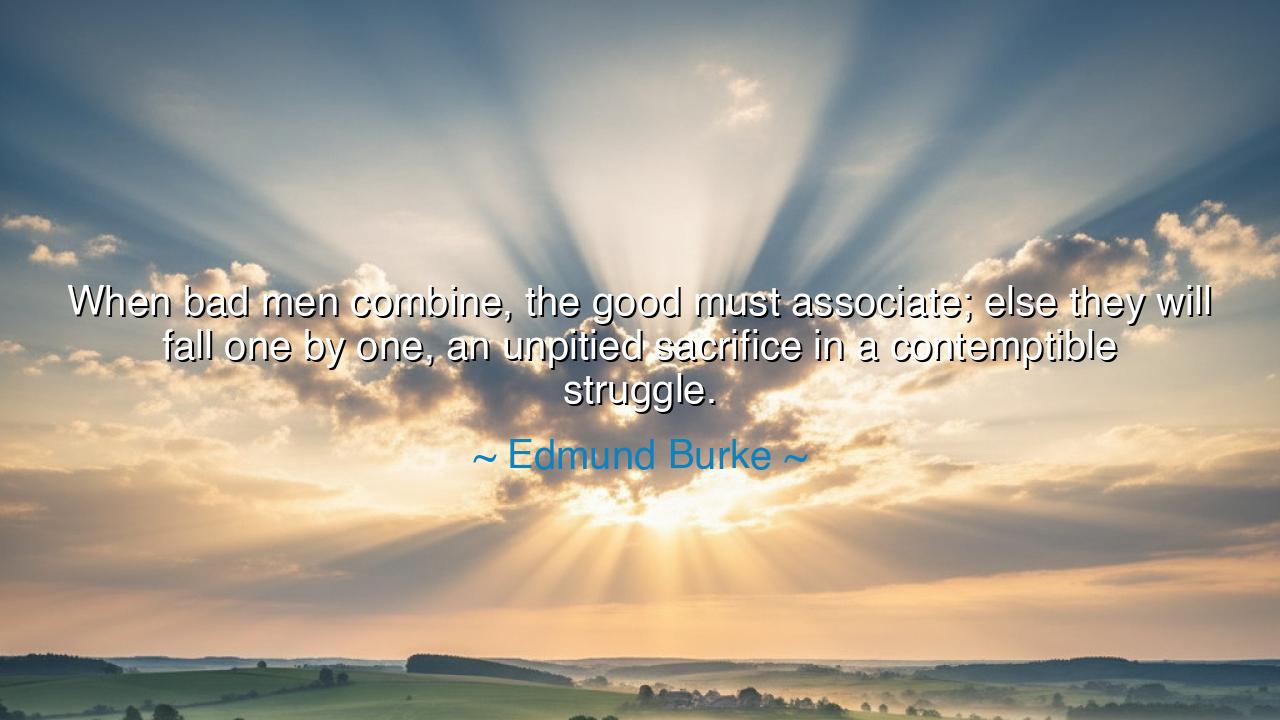
When bad men combine, the good must associate; else they will
When bad men combine, the good must associate; else they will fall one by one, an unpitied sacrifice in a contemptible struggle.






Hear the voice of Edmund Burke, statesman and prophet of liberty, who declared: “When bad men combine, the good must associate; else they will fall one by one, an unpitied sacrifice in a contemptible struggle.” These words are as a trumpet sounded in the night, warning all who sleep that danger creeps when the wicked unite. For evil, though cowardly in itself, finds its strength in numbers, and when the just stand divided, they become easy prey, scattered like sheep before the wolves.
The origin of this truth lies in Burke’s struggle against tyranny in the eighteenth century. He spoke these words in defense of freedom, in a world where corruption and oppression were often joined in secret alliances. He saw that the greatest threat to justice was not the wicked alone, but the hesitation of the righteous. For when the good remain isolated, silent, or fearful, they fall not as heroes, but as forgotten victims in a contemptible struggle. His call was not only political but eternal: unity is the shield of virtue, just as division is the victory of vice.
History bears this out. Consider the fall of the Roman Republic. When Julius Caesar and his allies sought to seize power, many senators knew the danger. Yet they quarreled among themselves, too divided to resist. One by one, they were destroyed or absorbed, until the Republic fell, and Rome became the Empire of emperors. Had the defenders of liberty associated, had they stood as one, the fate of Rome might have been different. But divided, they became sacrifices—unpitied, forgotten, swept aside by the tide of power.
So too in the story of Nazi Germany. The wicked combined early, shaping their party into a machine of terror. Meanwhile, those who opposed them—intellectuals, moderates, religious leaders—remained fractured, hesitant to unite. By the time they saw the storm clearly, it was too late. Those who resisted alone were crushed, one by one, their sacrifice noble but tragic, for it came without the strength of unity. Burke’s warning becomes a prophecy: if the good fail to associate, they will be overwhelmed by those who do not hesitate to combine.
Yet there are examples of hope. In the struggle for American independence, thirteen colonies, each different in custom and interest, chose to unite. Alone, each colony would have been crushed by the might of Britain. But by associating, they forged a nation and won freedom. Their victory was not only over muskets and cannons, but over division itself. In unity they found strength, and in strength they prevailed. This is Burke’s teaching made flesh: the good must join hands if they are to resist the march of tyranny.
The lesson for us is clear: do not fight alone when evil rises. Do not believe that your voice, however noble, can prevail without fellowship. Evil men are swift to combine, to whisper in secret, to conspire for power. Therefore, let the righteous be quicker still to unite, to form alliances, to lift one another. For it is only in solidarity that justice can endure. One man alone is a target; many men together are a fortress.
Therefore, O listener, take these words as law: seek out others who strive for what is good. Do not let pride or difference divide you from allies in the cause of justice. Remember that silence and isolation serve only the wicked, while unity and courage preserve the world. For if you do not, then you and those like you will fall one by one, sacrifices unremembered in a struggle both bitter and contemptible. But if you unite, then the cause of good will stand unbroken, a flame that no darkness can quench.






AAdministratorAdministrator
Welcome, honored guests. Please leave a comment, we will respond soon